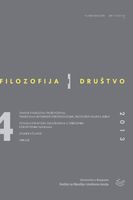Platonizam, kartezijanizam i Hegelova misao u trilogiji Matriks
Platonism, Cartesianism and Hegel's Thought in The Matrix Trilogy
Author(s): Predrag MilidragSubject(s): Philosophy
Published by: Institut za filozofiju i društvenu teoriju
Keywords: dualism; free will; unhappy consciousness; philosophy of history; Nietzsche; Marx; Neo; Morpheus
Summary/Abstract: In this article I will try to interpret changes in Neo, the main character in The Matrix Trilogy, against the background of the ideas of Plato and Descartes, as well as Hegel’s from his Philosophy of Historyand The Phenomenology of Spirit. Although “philosophical” The Matrix Trilogyis not long-winded and boring film: instead of talking endlessly, the characters are working ceaselessly, and that work is changing them. Contrary to widespread opinion, this interpretation does not find the presence of Descartes’ hyperbolic doubt in the first part of trilogy, but first film sees as a pure Platonism. Nevertheless, there are the Cartesian motifs (e.g. dualism, freeing mind from preconceived opinions, acquiring different habits of belief ). The result of the first film is the position of Hegelian unhappy consciousness. This is just a preparation for the key moment of whole Trilogy that is the dialogue between Neo and Architect. Neo’s decision to chose to save Trinity is interpreted in Hegel’s terms of the infinite right of the subject to satisfy himself in his activity and work; because of that, this, sixth Neo is new. After showing the differences in the objectives of Neo and Agent Smith, and transformations of the objectives of humans, the third part of the article analyzes the very end of the Matrix Revolutions, using Marx’s ideas, with some references to Plato and Nietzsche.
Journal: Filozofija i društvo
- Issue Year: 24/2013
- Issue No: 4
- Page Range: 268-282
- Page Count: 15
- Language: English

